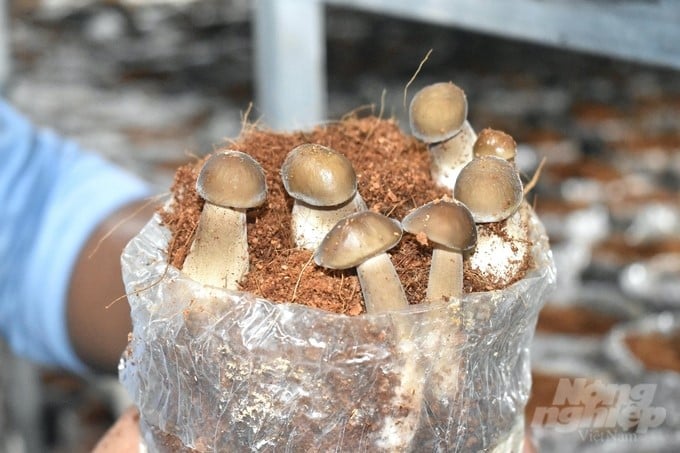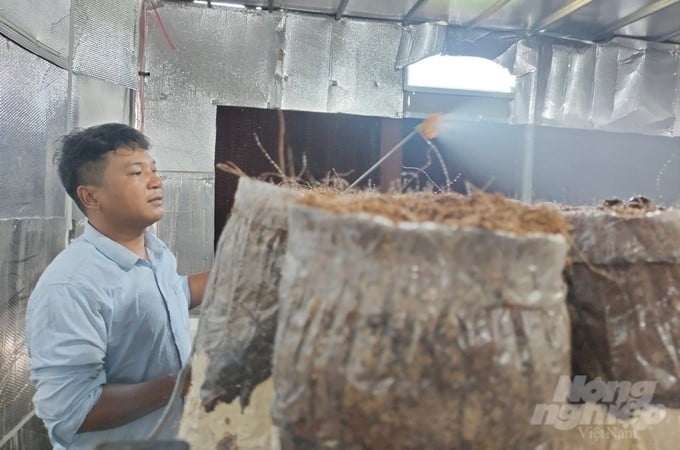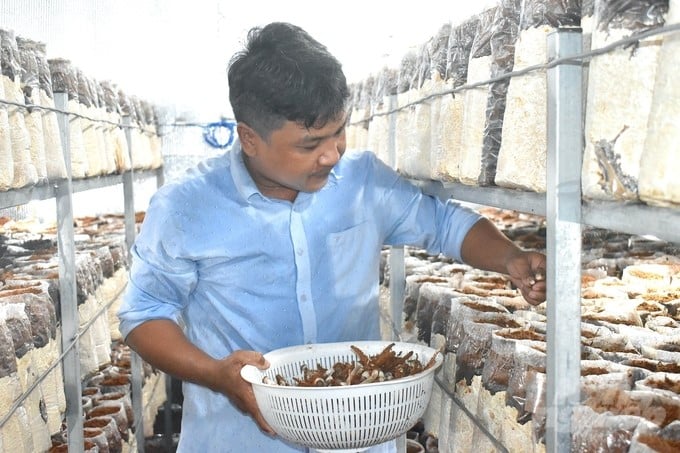May 29, 2025 | 15:53 GMT +7
May 29, 2025 | 15:53 GMT +7
Hotline: 0913.378.918
May 29, 2025 | 15:53 GMT +7
Hotline: 0913.378.918
Coming to Giong Lanh 1 hamlet, Tang Hoa commune (Go Cong district, Tien Giang), we asked about the house of Mr. Tran Quoc Bao (born in 1991), and everyone here all knew and showed clearly the way to this young man's house. He is better known to people since he grew black termite mushrooms, an economic model that is still quite new in this locality.

Black termite mushrooms are favored in the market thanks to their delicious quality and guaranteed safety. Photo: Minh Dam.
Black termite mushrooms are grown by Mr. Bao in a closed, air-conditioned room. The product is favored in the market because it is produced according to an organic process without the use of any chemicals, so safety is guaranteed.
Taking us to visit the mushroom farm, he shared that the mushroom-growing process is very simple. First, buy mushroom embryo bags, tie them tightly, put them in a cold room maintained at a temperature of 28–29 oC, and do not turn on the light (dark incubation). It will take about 3 weeks to produce mushrooms. After that, open the bag to add coconut coir, water, steam the light (light incubation), and 2 weeks later, start harvesting. Every day, just water the embryo bag with a mist spray bottle so that the humidity is sufficient.
During the care process, the moldy embryo needs to be removed from the room. In addition, when detecting ants or flies, it is necessary to spray on the wall to treat them and avoid spraying directly on the mushroom embryos.
When the mushrooms sprout from the coconut coir layer, they need to be harvested promptly. They must be harvested every 8 hours; otherwise, they will quickly die. When harvested, mushroom volva needs to be cleaned, and mushrooms need to be put in bags, vacuum-sealed, and stored in the cool refrigerator compartment. Mushrooms can keep good quality for 7–10 days.

Watering black termite mushrooms. Photo: Minh Dam.
From the time of picking the first mushroom, growers harvest continuously for 3.5 months; each embryo bag will yield 300–350 g of mushrooms. After that, embryo bags need to be removed to sanitize the farm, and diseased mushrooms need to be quarantined for 2 months, preparing for the next batch.
Currently, Mr. Bao has 6,000 embryo bags that are producing mushrooms. Every day he harvests 3 batches, yielding 5–6 kg. Especially on days when mushrooms grow in abundance, the yield can be over 10 kg.
The mushrooms are sweet and crispy, and many consumers evaluate their deliciousness rate at 70–80% compared to natural termite mushrooms (gray termite mushrooms). Therefore, although black termite mushrooms have been on the market for a long time, their value has not decreased. Currently, the retail price of black termite mushrooms ranges from VND 270,000 to 350,000/kg, depending on location and quality. The wholesale price for eateries and restaurants is lower. However, Mr. Bao revealed that, after deducting expenses, his monthly income ranges from VND 13 to 15 million.
According to Mr. Bao, black termite mushrooms are easy to grow but require quite a bit of investment capital, including the expenses of building a farm, buying shelves, air conditioners, mist fans, and mushroom embryos (VND 14,000/embryo), etc.

Harvesting black termite mushrooms. Photo: Minh Dam.
“My initial investment cost is VND 200 million. Every month, electricity costs VND 2 million, and coconut coir costs VND 2 million. The cost is quite high, but in return, I have income every day and do not need to work as an employee," Mr. Bao shared.
However, he also said that although black termite mushrooms are easy to grow, there must be a ready output because the price of mushrooms is high. With the accumulated experience, in the coming time, Mr. Bao will expand the farm scale to 19,000 embryos to increase output and meet market demand.
Mr. Tran Quoc Bao, with his diligence and hard work, has succeeded with the model of growing black termite mushrooms. At the locality, he also participates in union work and is willing to share his mushroom-growing experience with surrounding relatives and friends. Currently, Tang Hoa commune has expanded a black termite mushroom farm.
Currently, people are interested in learning about and experimenting with the model of growing black termite mushrooms, so mushroom embryos are also very popular.
Mr. Huynh Van Cuong, Director of Huynh Cuong Production and Trading Company Limited in Tan Phu Dong district (Tien Giang), said that the company has provided black termite mushroom embryos to people since 2016. Each month, the business is now supplying 20,000–30,000 embryo bags to the market for farmers in provinces from Binh Thuan to the South. Because embryos need to be incubated in a cold room for about 2 months, farmers need to contact the company in advance to get the goods.
Translated by Thu Huyen

(VAN) FAO’s Director-General addresses the 5th Baghdad International Water Conference.
/2025/05/26/1716-4-nongnghiep-191706.jpg)
(VAN) Chain linkages, technological innovation, and raw material zoning are three strategic pillars for the coconut industry to strongly develop and elevate its position on the global agricultural map.
![Advanced mariculture – an inevitable trend: [4] Accompanied by scientists](https://t.ex-cdn.com/nongnghiepmoitruong.vn/608w/files/sohk/2025/05/13/1941-pgsts-vo-van-nha-140958_717.jpg)
(VAN) According to Assoc. Prof. Dr. Vo Van Nha, Director of the RIA III, the development of advanced offshore mariculture is no longer an option but an essential path for Vietnam’s fisheries sector.

(VAN) Vietnam is intensifying the development of mollusk farming areas that meet international standards, aiming for sustainable growth and enhancing its export position in the global seafood market.
![Advanced mariculture – an inevitable trend: [3] Policy-driven momentum](https://t.ex-cdn.com/nongnghiepmoitruong.vn/608w/files/doanhtq/2025/05/21/0104-0616-0348-nuoi-bien-170339_789.jpg)
(VAN) To ensure the success of offshore mariculture that uses advanced technologies, it is essential to establish supportive policies that inspire both individuals and enterprises to invest with confidence.
![Advanced mariculture – an inevitable trend: [2] Outstanding results](https://t.ex-cdn.com/nongnghiepmoitruong.vn/608w/files/sohk/2025/05/12/4632-4136-nuoi-bien-11-164117_819.jpg)
(VAN) Pilot models of high-tech offshore mariculture in Vietnam, particularly in the South Central Coast region, have demonstrated exceptional economic returns and sustainability, setting a new direction for the country’s aquaculture industry.
![Advanced mariculture – an inevitable trend: [1] Moving offshore](https://t.ex-cdn.com/nongnghiepmoitruong.vn/608w/files/phucpm/2025/05/18/0252-2436-nuoi-bien-6-162148_783.jpg)
(VAN) Mariculture using advanced technology and moving offshore is an inevitable trend, as nearshore areas increasingly reveal limitations.